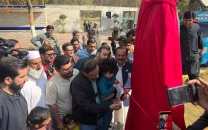Marital rape and Islamic principles: a delicate balance
The most respectful and dignified approach is to address these issues through open and honest communication

“It is only a man of high character who treats women with respect and dignity, and it is a man of low character who treats women poorly.”
These chosen words of Prophet Muhammad (peace be upon him) had clearly defined a man of high character, the one who treats women with respect. Someone who treats women with dignity would not even have intimate relations with his own wife against her will by-force.
The recent landmark ruling of Additional District and Sessions Judge in Karachi, Pakistan — where the court found the accused husband guilty of section 377 (unnatural offences) of the Pakistan Penal Code (PPC) for forcefully subjecting his wife to sodomy, was sentenced for marital rape to imprisonment for three years and a fine of Rs30,000 — has sparked a significant conversation about the intersection of law, culture and religion.
This article aims to explore this issue, acknowledging the importance of consent within marriage, the rights Islam grants to women and the potential societal implications of such legal decisions. This judgment is based on Section 377 which does not cover the jurisprudential scope of conviction as rape in matrimonial relations in an Islamic society.
There is another section of PPC, Section 375, that defines the crime of rape and provides a comprehensive definition of rape but does not explicitly address marital rape. Marital rape is the act of sexual intercourse with one’s spouse without the spouse’s consent. It is considered a form of domestic violence and sexual abuse.
In the context of marital relations, Islam places great importance on mutual consent and consideration. If a woman is ill, physically or psychologically, or due to medical advice unable to engage in sexual activities, her condition may worsen if she is forced into it.
In such cases, the husband is prohibited from forcing his wife to have intercourse; and if he does so, he would be sinful. A healthy and well-supported wife is more likely to want marital intimacy. A constantly sick and exhausted wife, understandably, would not be able to give of herself in that way.
Therefore, in Islam, the husband is required to show consideration towards his wife’s health and well-being.
This principle underscores the importance of mutual respect and understanding in maintaining a healthy marital relationship. They provide a strong foundation for advocating for more explicit legal protections against marital rape in Muslim-majority countries.
The most respectful and dignified approach is to address these issues through open and honest communication. Under no circumstances is it allowed for husband to harm his wife to exercise so-called rights. That is strictly prohibited in Islam which instructs us to refer such very private and personal disputes to elders and close family members.
While the recognition of marital rape as a criminal offence is a significant step towards safeguarding women’s rights, it is essential to consider the potential societal implications. There is a concern that such laws could be exploited, leading to the disintegration of family systems in Pakistan.
However, it is crucial to remember that the objective of these laws is not to disrupt family structures but to protect individuals within these families from harm and injustice. However, many countries, including Pakistan, do not have specific laws addressing marital rape.
This is a significant gap in the legislation, as it fails to protect individuals from sexual violence within the context of marriage. To address this issue, a new section could be added to PPC 375 specifically addressing marital rape.
This section should clearly state that consent is necessary for all sexual acts, regardless of marital status. It should also outline the penalties for marital rape, which should be commensurate with the seriousness of the crime. This amendment would send a clear message that all forms of sexual violence, including marital rape, are unacceptable and punishable by law.
In addition to amending Section 375, a new act could be introduced to provide further protections against marital rape. This act could include provisions for support services for victims, such as counseling and legal aid. It could also mandate education and awareness campaigns to challenge societal norms that may contribute to the prevalence of marital rape.
This comprehensive approach would not only provide legal recourse for victims but also work towards preventing marital rape by addressing its root causes.
In addressing marital disputes, the establishment of reconciliation centres at union council level could be a viable solution. These centres, ideally headed by a psychiatrist doctor, lawyers and ulema, could work towards reconciling couples and resolving disputes in a manner that aligns with Islamic teachings and principles.
This approach could potentially prevent the immediate filing of cases that might lead to long-term damage to the couple’s future. It could be proposed that the first place to institute this case would be before this centre, rather than the police stations or courts, in order to provide a realistic path towards the reconciliation between the couple.
In the legal framework, a distinct separation between stranger rape and marital rape needs to be established as long as it is within the Islamic teachings. Both boys and girls need to be educated about women’s roles in society, as well as their economic and social contributions, as part of their formal education.
Civic education that portrays women as dignified members of society deserving of respect and support should be developed at all educational levels.
The recent ruling on marital rape in Pakistan is a significant milestone in the fight for women’s rights. However, it is crucial to navigate this issue with sensitivity towards Islamic principles and the societal context of Pakistan. As such, any discourse on this topic should be rooted in these teachings.
The establishment of reconciliation centres could provide a balanced approach to addressing marital disputes, ensuring the protection of women’s rights while preserving the sanctity of the family structure.
Published in The Express Tribune, March 18th, 2024
Like Opinion & Editorial on Facebook, follow @ETOpED on Twitter to receive all updates on all on our daily pieces.















COMMENTS
Comments are moderated and generally will be posted if they are on-topic and not abusive.
For more information, please see our Comments FAQ